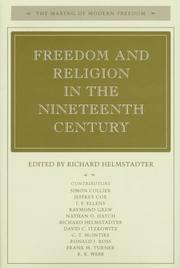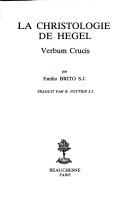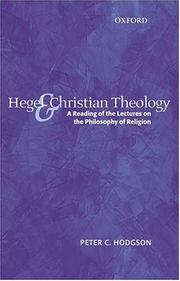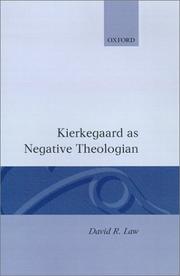| Listing 1 - 10 of 11 | << page >> |
Sort by
|

ISBN: 0804730873 9780804730877 Year: 1997 Volume: *5 Publisher: Stanford, Calif. Stanford University Press
Abstract | Keywords | Export | Availability | Bookmark
 Loading...
Loading...Choose an application
- Reference Manager
- EndNote
- RefWorks (Direct export to RefWorks)
Freedom of religion --- History --- 19th century --- Freedom of religion - History - 19th century.

ISBN: 9782701010564 270101056X Year: 1983 Publisher: Paris : Beauchesne,
Abstract | Keywords | Export | Availability | Bookmark
 Loading...
Loading...Choose an application
- Reference Manager
- EndNote
- RefWorks (Direct export to RefWorks)
Book
ISBN: 3820488227 9783820488227 Year: 1986 Volume: 1 Publisher: Frankfurt am Main Lang
Abstract | Keywords | Export | Availability | Bookmark
 Loading...
Loading...Choose an application
- Reference Manager
- EndNote
- RefWorks (Direct export to RefWorks)
Nietzsche, Friedrich W. --- Philosophical anthropology --- Religion --- God --- History --- History of doctrines --- Nietzsche, Friedrich Wilhelm, --- -Philosophical anthropology --- -Religion --- -Religion, Primitive --- Atheism --- Irreligion --- Religions --- Theology --- Anthropology, Philosophical --- Man (Philosophy) --- Civilization --- Life --- Ontology --- Humanism --- Persons --- Philosophy of mind --- Metaphysics --- Misotheism --- Monotheism --- Theism --- -History --- -Philosophy --- Nietzsche, Friedrich Wilhelm --- -History of doctrines --- -Nietzsche, Friedrich Wilhelm --- Nietzsche, Friedrich --- Religion, Primitive --- Nietzsche, Friederich --- Philosophical anthropology - History - 19th century --- Religion - History - 19th century --- God - History of doctrines - 19th century --- Nietzsche, Friedrich Wilhelm, - 1844-1900
Book
ISBN: 3506761781 9783506761781 Year: 1995 Publisher: Paderborn Schöningh
Abstract | Keywords | Export | Availability | Bookmark
 Loading...
Loading...Choose an application
- Reference Manager
- EndNote
- RefWorks (Direct export to RefWorks)
Women and religion --- Women in the Catholic Church --- Piety --- History --- 248-055.2 --- 248.21 --- Vrouwen en spiritualiteit --- Mystieke verschijnselen. Charisma's --- 248.21 Mystieke verschijnselen. Charisma's --- 248-055.2 Vrouwen en spiritualiteit --- Religion and women --- Women in religion --- Religion --- Sexism in religion --- Christian life --- Spiritual life --- Women and religion - History - 19th century --- Women and religion - History - 20th century --- Women in the Catholic Church - History - 19th century --- Women in the Catholic Church - History - 20th century
Book
ISBN: 1800731590 9781800731585 9781800731578 1800731574 1800731582 Year: 2021 Publisher: New York, New York : Berghahn,
Abstract | Keywords | Export | Availability | Bookmark
 Loading...
Loading...Choose an application
- Reference Manager
- EndNote
- RefWorks (Direct export to RefWorks)
The life and career of one of anthropology’s most important ancestors, William Robertson Smith in the context of the history of anthropology. William Robertson Smith’s influence on anthropology ranged from his relationship with John Ferguson McLennan, to advising James George Frazer to write about “Totem” and “Taboo” for the Encyclopaedia Britannica that he edited. This biography places a special emphasis on the notes and observations from his travels to Arabia, as well as on his influence on the representatives of the “Myth and Ritual School.” With his discussion of myth and ritual, Smith influenced generations of scholars, and his insistence on the connection between the people, their God, and the land they inhabited inspired many of the concepts later developed by Émile Durkheim. “This is a clear, well-informed and interesting account of Robertson Smith’s central ideas. The theories are set in the context of debates of the day, and their influence on anthropology and bible studies is discussed. An original and fascinating section reviews Robertson Smith’s field work in the Middle East, which was much more extensive and intensive than is, I think, generally appreciated.”—Adam Kuper, London School of Economics From the introduction: Although respected and studied, especially since the 1990s, Smith has a somewhat paradoxical position in the history of social and cultural anthropology. Anthropologists educated in the twentieth century admire him, but many contemporary scholars are not quite sure what to make of him.
Myth and ritual school. --- Anthropology of religion --- Anthropologists --- History --- James George Frazer. --- John Ferguson McLennan. --- William Robertson Smith. --- anthropologist. --- anthropology. --- biography. --- durkheim. --- folklore. --- myth. --- ritual. --- social anthropology. --- sociology. --- Émile Durkheim. --- Myth --- Ritual --- Scientists --- Religious anthropology --- Ethnology --- Study and teaching --- Anthropologists - Scotland - 19th century - Biography --- Anthropology of religion - History - 19th century --- Myth and ritual school --- Orientalism --- Smith, William Robertson, - 1846-1894 --- Smith, W. Robertson --- Smīth, Rūbirtsūn, --- Smith, William Robertson,

ISBN: 0199273618 0191602442 1435622170 0199235716 9786611190538 0191534307 1281190535 9780199273614 Year: 2005 Publisher: New York (N.Y.) Oxford university press
Abstract | Keywords | Export | Availability | Bookmark
 Loading...
Loading...Choose an application
- Reference Manager
- EndNote
- RefWorks (Direct export to RefWorks)
Philosophy and religion --- Theology, Doctrinal --- History --- Hegel, Georg Wilhelm Friedrich, --- Christianity and philosophy --- Religion and philosophy --- Religion --- Hegel, Georg Wilhelm Friedrich. --- Hegel, Giorgio Guglielmo Frederico --- Hegel, Georg Wilhelm Friedrich --- Hēgeru, --- Hei-ko-erh, --- Gegelʹ, Georg, --- Hījil, --- Khegel, --- Hegel, G. W. F. --- Hegel, --- Hei Ge Er, --- Chenkel, --- Hīghil, --- הגל, --- הגל, גאורג וילהלם פרידריך, --- הגל, גיאורג וילהלם פרידריך, --- הגל, ג.ו.פ, --- היגל, גורג ווילהלם פרדריך, --- היגל, גיורג וילהלם פרידריך, --- 黑格尔, --- Hegel, Guillermo Federico, --- Hegel, Jorge Guillermo Federico, --- Heyel, Georg Wilhelm Friedrich, --- Higil, Gʼūrg Vīlhim Frīdrīsh, --- هگل, --- هگل، گئورگ ويلهم فريدريش, --- Philosophy and religion - History - 19th century. --- Theology, Doctrinal - History - 19th century. --- Hegel, Georg Wilhelm Friedrich, - 1770-1831.
Book
ISBN: 2130374271 9782130374275 Year: 1982 Publisher: Paris Presses universitaires de France
Abstract | Keywords | Export | Availability | Bookmark
 Loading...
Loading...Choose an application
- Reference Manager
- EndNote
- RefWorks (Direct export to RefWorks)
Religious studies --- Hegel, Georg W.F. --- Religion --- History --- Histoire --- Hegel, Georg Wilhelm Friedrich, --- Religion. --- -#GROL:SEMI-1-05'18' Hege --- Religion, Primitive --- Atheism --- God --- Irreligion --- Religions --- Theology --- -Hegel, Georg Wilhelm Friedrich --- -Religion --- -Hegel, Giorgio Guglielmo Frederico --- #GROL:SEMI-1-05'18' Hege --- Hegel, Giorgio Guglielmo Frederico --- Hegel, Georg Wilhelm Friedrich --- Philosophie de la religion --- Hēgeru, --- Hei-ko-erh, --- Gegelʹ, Georg, --- Hījil, --- Khegel, --- Hegel, G. W. F. --- Hegel, --- Hei Ge Er, --- Chenkel, --- Hīghil, --- הגל, --- הגל, גאורג וילהלם פרידריך, --- הגל, גיאורג וילהלם פרידריך, --- הגל, ג.ו.פ, --- היגל, גורג ווילהלם פרדריך, --- היגל, גיורג וילהלם פרידריך, --- 黑格尔, --- Hegel, Guillermo Federico, --- Hegel, Jorge Guillermo Federico, --- Heyel, Georg Wilhelm Friedrich, --- Higil, Gʼūrg Vīlhim Frīdrīsh, --- هگل, --- هگل، گئورگ ويلهم فريدريش, --- Religion - History - 19th century --- Hegel, Georg Wilhelm Friedrich, - 1770-1831 - Religion --- Hegel, Georg Wilhelm Friedrich, - 1770-1831
Book
ISBN: 9780567032805 0567032809 9780567032812 0567032817 Year: 2009 Publisher: London Clark
Abstract | Keywords | Export | Availability | Bookmark
 Loading...
Loading...Choose an application
- Reference Manager
- EndNote
- RefWorks (Direct export to RefWorks)
Philosophy and religion --- Theology, Doctrinal --- History --- Hegel, Georg Wilhelm Friedrich, --- 215.1 --- 1 HEGEL, GEORG WILHELM FRIEDRICH --- Verhouding godsdienst en filosofie --- Filosofie. Psychologie--HEGEL, GEORG WILHELM FRIEDRICH --- 1 HEGEL, GEORG WILHELM FRIEDRICH Filosofie. Psychologie--HEGEL, GEORG WILHELM FRIEDRICH --- 215.1 Verhouding godsdienst en filosofie --- Christianity and philosophy --- Religion and philosophy --- Religion --- Hegel, Giorgio Guglielmo Frederico --- Hegel, Georg Wilhelm Friedrich --- Hegel, Georg Wilhelm Friedrich. --- Hēgeru, --- Hei-ko-erh, --- Gegelʹ, Georg, --- Hījil, --- Khegel, --- Hegel, G. W. F. --- Hegel, --- Hei Ge Er, --- Chenkel, --- Hīghil, --- הגל, --- הגל, גאורג וילהלם פרידריך, --- הגל, גיאורג וילהלם פרידריך, --- הגל, ג.ו.פ, --- היגל, גורג ווילהלם פרדריך, --- היגל, גיורג וילהלם פרידריך, --- 黑格尔, --- Hegel, Guillermo Federico, --- Hegel, Jorge Guillermo Federico, --- Heyel, Georg Wilhelm Friedrich, --- Higil, Gʼūrg Vīlhim Frīdrīsh, --- هگل, --- هگل، گئورگ ويلهم فريدريش, --- Philosophy and religion - History - 19th century. --- Theology, Doctrinal - History - 19th century. --- Hegel, Georg Wilhelm Friedrich, - 1770-1831.

ISBN: 0691010242 0691028761 0691212724 9780691010243 Year: 2000 Publisher: Princeton Princeton University Press
Abstract | Keywords | Export | Availability | Bookmark
 Loading...
Loading...Choose an application
- Reference Manager
- EndNote
- RefWorks (Direct export to RefWorks)
Fits, trances, visions, speaking in tongues, clairvoyance, out-of-body experiences, possession. Believers have long viewed these and similar involuntary experiences as religious--as manifestations of God, the spirits, or the Christ within. Skeptics, on the other hand, have understood them as symptoms of physical disease, mental disorder, group dynamics, or other natural causes. In this sweeping work of religious and psychological history, Ann Taves explores the myriad ways in which believers and detractors interpreted these complex experiences in Anglo-American culture between the mid-eighteenth and early-twentieth centuries. Taves divides the book into three sections. In the first, ranging from 1740 to 1820, she examines the debate over trances, visions, and other involuntary experiences against the politically charged backdrop of Anglo-American evangelicalism, established churches, Enlightenment thought, and a legacy of religious warfare. In the second part, covering 1820 to 1890, she highlights the interplay between popular psychology--particularly the ideas of "animal magnetism" and mesmerism--and movements in popular religion: the disestablishment of churches, the decline of Calvinist orthodoxy, the expansion of Methodism, and the birth of new religious movements. In the third section, Taves traces the emergence of professional psychology between 1890 and 1910 and explores the implications of new ideas about the subconscious mind, hypnosis, hysteria, and dissociation for the understanding of religious experience. Throughout, Taves follows evolving debates about whether fits, trances, and visions are natural (and therefore not religious) or supernatural (and therefore religious). She pays particular attention to a third interpretation, proposed by such "mediators" as William James, according to which these experiences are natural and religious. Taves shows that ordinary people as well as educated elites debated the meaning of these experiences and reveals the importance of interactions between popular and elite culture in accounting for how people experienced religion and explained experience. Combining rich detail with clear and rigorous argument, this is a major contribution to our understanding of Protestant revivalism and the historical interplay between religion and psychology.
Psychology, Religious. --- Methodism. --- Experience (Religion) --- Methodism --- Psychology, Religious --- Religious experience --- Psychology of religion --- Religion --- Religions --- Religious psychology --- Psychology and religion --- Arminianism --- Church polity --- Dissenters, Religious --- Episcopacy --- Evangelical Revival --- History --- Psychological aspects --- Psychology --- Buddha. --- Emmanuel Movement. --- Magnet, The (Sunderland). --- New Thought. --- Presbyterians, Scottish. --- Puritanism. --- Quakers. --- Theosophy. --- adepts, theosophical. --- agency, human. --- catalepsy. --- clairvoyance. --- consciousness. --- delusions, religious. --- enthusiasm. --- fluids: magnetic. --- hell. --- imagination. --- inspiration. --- mental weakness. --- nervous instability. --- out-of-body experience. --- psychical research. --- race: and congregational makeup. --- shamanism. --- shekinah. --- temple: as biblical type. --- voices. --- Experience (Religion) - History - 18th century --- Psychology, Religious - History - 18th century --- Methodism - History - 18th century --- Experience (Religion) - History - 19th century --- Psychology, Religious - History - 19th century --- Methodism - History - 19th century --- religious and psychological hsitory --- fits --- trances --- visions --- speaking in tongues --- clairvoyance --- out-of-body experiences --- possession --- religious experience --- Anglo-American culture --- Evangelism --- Enlightenment thought --- religious warfare --- professional psychology --- the subconscious mind --- hypnosis --- hysteria --- dissociation --- supernatural phenomena --- religion and nature --- Protestant revivalism

ISBN: 0198263368 0191682500 Year: 1993 Volume: vol *5 Publisher: Oxford Clarendon
Abstract | Keywords | Export | Availability | Bookmark
 Loading...
Loading...Choose an application
- Reference Manager
- EndNote
- RefWorks (Direct export to RefWorks)
1 KIERKEGAARD, SOREN --- Filosofie. Psychologie--KIERKEGAARD, SOREN --- Kierkegaard, Soren --- 1 KIERKEGAARD, SOREN Filosofie. Psychologie--KIERKEGAARD, SOREN --- Anti-climacus --- H. H. --- Hidden God --- Knowledge, Theory of (Religion) --- Epistemology, Religious --- Religious epistemology --- Religious knowledge, Theory of --- Religion --- Theology, Doctrinal --- Deus Absconditus --- God --- God, Hidden --- Silence of God --- History of doctrines --- History --- Philosophy --- Absence --- Silence --- Knowableness --- Kierkegaard, Søren, --- Kierkegaard, Søren --- Kierkegaard, Søren. --- 19th century --- Knowledge [Theory of ] (Religion) --- Kierkegaard, S ren, 1813-1855. --- Hidden God - History of doctrines - 19th century. --- Knowledge, Theory of (Religion) - History - 19th century. --- Anti-Climacus, --- Bogbinder, Hilarius, --- Chʻi-kʻo-kuo, --- Climacus, Johannes, --- Constantius, Constantin, --- Eremita, Victor, --- Haufniensis, Vigilius, --- Johannes, Climacus, --- Johannes de Silentio, --- Kʹerkegor, Seren, --- Kierkegaard, S. --- Kierkegaard, Severino, --- Kierkegaard, Søren Aabye, --- K'i︠e︡rkegor, Sʹoren, --- Kīrkajūrd, Sūrīn, --- Kirkegaard, Soeren, --- Kirkegor, Seren, --- Ḳirḳegor, Sern, --- Kirkegors, Sērens, --- Kirukegōru, Søren, --- Kjerkegor, Seren, --- Kʻo-erh-kʻai-ko-erh, --- Notabene, Nicolaus, --- Silentio, Johannes de, --- Sūrīn Kīrkajūrd, --- Victor, Eremita, --- Vigilius, Haufniensis, --- קירקגור, סרן --- קירקגור, סורן --- קירקגור, סירן --- קירקגור, סירן, --- קירקגורד, סרן, --- 克尓凯郭尓,
| Listing 1 - 10 of 11 | << page >> |
Sort by
|

 Search
Search Feedback
Feedback About UniCat
About UniCat  Help
Help News
News